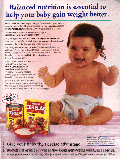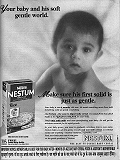Issue number 22, February/March 1997
Boycott Summary
The International Nestlé Boycott is in effect in 18 countries. The boycott will continue until Nestlé ends its irresponsible marketing of breastmilk substitutes worldwide and abides by the the International Code of Marketing of Breast-milk Substitutes and subsequent Resolutions in policy and practice. The Boycott is supported in the UK by over 100 church, health and consumer groups, over 90 businesses, 80 student unions, 17 local authorities, 12 trade unions, 74 politicians and political parties and many celebrities.
Page Contents:
The Boycott - prompting wider action
The baby milk issue has been brought to the attention of the national and international media once again following the publication of research commissioned by the Interagency Group on Breastfeeding Monitoring, which arose directly from the Boycott. (see Update 20)
The research has demonstrated to those who were doubtful that much more needs to be done to protect breastfeeding and many agencies are now calling for strong legislation and independent monitoring which will affect all companies.
The report of IGBM's monitoring in four cities did not include an overall league table of companies. IBFAN's own 1994 report, which was based on sample surveys in 23 countries and evidence from 62 countries identified Nestlé as responsible for aprox 30% of the violations found, far more than any other company. IBFANÕs next report is due later this year.
As one of the world's largest food manufacturers, with a turnover of US$42 billion (£904 of food sales every second) Nestlé controls approx 40% of the worldwide market for baby food. It influences UN systems, food legislation, market trends and company behaviour more than any other food company.
The boycott is having an important impact on Nestlé, not only in direct economic terms, but also in the damage to its corporate image, management morale and the management time the company must spend trying to combat it. In recent years many companies have reversed policies as a result of public pressure, to the benefit of people, the environment and their own images. Nestlé has only curbed some of its more blatant malpractice.
With enough pressure Nestleé will change and fully abide by the International Code and the Resolutions in both policy and practice. Once Nestleé makes a committment to do this it will be in its own interest to stop obstructing governments who wish to protect infant health.
Nestlé's reaction to IGBM
The Interagency Group on Breastfeeding Monitoring report "Cracking the Code", detailed the massive scale of company marketing malpractice (See main report in Update 20). On the day the report was launched, before even seeing a copy, a Nestlé spokesperson announced on the BBC World Service that the company would not "accept reproaches from self appointed groups."
In the Church Times Nestlé said, "The position of the company is not changed by the research. We promised the [Church of England] Synod that the company would adhere to the Code...We stand by this promise."
A week later Nestlé's line, as reported in the British Medical Journal was, "We take this report seriously."
Nestlé advertises to counter the boycott
Since the 1970s Nestlé has published numerous glossy brochures, and a dozen policy documents which aim to present a squeaky clean image to those who question its marketing practices. Last October, it went one step further and placed a newspaper advertisement in the Oxford Independent. The advertisement attempts to portray Nestlé as a wholly beneficial force, however the distortion of facts required to do this is likely to do their reputation more harm than good. Either way, it does nothing to benefit the mothers and babies who are harmed by the company's unethical marketing practices.
The advert claims that, "Even before the World Health Organisation International Code of Marketing of Breast-milk Substitutes was introduced in 1981 Nestle marketed infant formula ethically and responsibly and has done so ever since." No mention is made of the 1981 statement about the Code by Earnest Saunders, then Vice President of Nestlé: " The World Industry has found this present draft code unacceptable... highly restrictive ... " Neither was there any mention of the criminal charges against Nestle in India, its challenge to the Indian law or its attempts to undermine strong baby food legislation in the Philippines, Ghana, Pakistan, Uganda and Europe.
Instead of addressing these important questions the advert focusses on the dilemma facing one Indian mother called Shreela ("based on a real situation") who, because she is soon to return to work "cannot continue breastfeeding." Shreela is in fact far from typical for many reasons: described as a clerk, [who would earn aprox £40 a month] she is privileged. 60% of people in India live below the poverty line and most do not have taps in their homes or access to adequate sanitation. The implication that Shreela cannot breastfeed is also false. Virtually all women in India work, and most continue breastfeeding at night or whenever they are able. A six-month old baby, like the one pictured, could eat family food during the day.
The advert fails to point out that Nestlé baby milk and feeding apparatus will cost Shreela at least £15 each month, about 40% of her income.
Dr William Cutting, of the Department of Child Life and Health, Edinburgh University, administers a Nestlé Foundation grant. He was disturbed by the advertisement because he has worked for many years in India and knows the realities. He took the principled action of writing to Nestlé to ask why the advert was so misleading.
The advert refers to Nestlé's new Charter - Nestlé infant formula policy in developing countries.
Unlike the International Code and World Health Assembly Resolutions Nestlé's Charter:
- applies only to developing countries
- is limited to infant formulas not all breastmilk substitutes
- does not ban free supplies
Despite Charter promises, Nestlé:
- has tried to undermine legislation in many countries
- promotes its products to mothers through health facilities
- gives gifts to health workers to promote its products
- has never disciplined a member of staff for any of the
many violations of the International Code which have been reported.
Tricks of the trade in India
 Prevented by law from advertising baby milks in India, Nestlé still aggressively promotes other expensive processed baby food products with idealised pictures of babies on the tins and promotion which is likely to undermine breastfeeding. It is the sole advertiser of baby foods in the Indian edition of Parenting magazine, (adverts for cerelac and nestum as shown above), and Cerelac adverts adorn many pharmacies. A pharmacist in Jaipur said that only Nestl? reps are offering payment in return for a prominent display of baby foods. He receives 200 rupees each month.
Prevented by law from advertising baby milks in India, Nestlé still aggressively promotes other expensive processed baby food products with idealised pictures of babies on the tins and promotion which is likely to undermine breastfeeding. It is the sole advertiser of baby foods in the Indian edition of Parenting magazine, (adverts for cerelac and nestum as shown above), and Cerelac adverts adorn many pharmacies. A pharmacist in Jaipur said that only Nestl? reps are offering payment in return for a prominent display of baby foods. He receives 200 rupees each month.
 The Yorkshire TV film, Bottle Feeding in India, shows the impact of such marketing. Rubina Gupta, from the Dharavi slum in Bombay, was shown bottle feeding Cerelac to her son, Ishrat. Rubina saw the bonny baby on the tin in a pharmacy and thought it would be good for Ishrat. She couldn't read the instructions that said it was for babies over 4 months and was feeding it by bottle to Ishrat from the age of 2 months. Ishrat became prone to diarrhoea and became malnourished.
The Yorkshire TV film, Bottle Feeding in India, shows the impact of such marketing. Rubina Gupta, from the Dharavi slum in Bombay, was shown bottle feeding Cerelac to her son, Ishrat. Rubina saw the bonny baby on the tin in a pharmacy and thought it would be good for Ishrat. She couldn't read the instructions that said it was for babies over 4 months and was feeding it by bottle to Ishrat from the age of 2 months. Ishrat became prone to diarrhoea and became malnourished.
Participants at a Nestlé Nutrition Symposium at the New Delhi Family Planning Association of India entitled the Hazards of Unmodified Bovine milk, expected a scientific talk. However, before long Nestlé's Medical Detailing Officer, D Chowdury launched into a promotion of Nestlé baby foods, describing Cerelac as nutritious and cheap, Nestum as very effective in diarrhoea control and Lactogen 1 as being close to breastmilk.
Nestlé lobbies for "strictly enforced" laws to protect its nest
Nestlé President Helmut Maucher's "biggest gripe is over-regulation", according to a Financial Times interview published on 29th October last year. Nestlé has tried to undermine attempts to bring in strong baby food legislation in many countries. So why was Nestlé's Peter Brabeck appealing for governments to introduce strictly enforced legislation?
Nestlé Vice President, Peter Brabeck, addressed Government representatives of developing countries at the October 1996 Global Investment Forum organised by the United Nations Conference on Trade and Development (UNCTAD).
While calling for speedy deregulation of trade, he stressed the importance of brand protection, which he would like to see "entrenched in the law and strictly enforced by the authorities". He explained that, "For us, brands are not just a gimmick to dazzle the consumers... We use brands in the first place as a means of communication... Our corporate brand - the nest - is the seal, it takes our products out of the anonymity which one might find with other products...The consumers' trust helps us to introduce completely new concepts... "
For decades Nestlé has used 'the nest' to get mothers to 'trust' in products which have caused suffering to infants all over the world.
"Business...should not be lumped with the many single-issue NGOs, but be accepted as an interlocutor of a different stature, as the engineers of wealth."
Peter Brabeck, Nestlé Vice President, explaining why the International Chamber of Commerce "pushed hard" to be allowed to address Government representatives from developing countries at the UNCTAD Global Forum.
Boycott action
The Ramblers
Nestlé sponsored the recent Ramblers' Association's Festival of Winter Walks in the UK in a £6,500 deal which linked its Fibre 1 breakfast cereal with active outdoor people. Fibre 1's name and logo appeared in Winter Walks publicity materials which had to be cleared with Nestlé and the sponsorship had to be highlighted in the Winter 1996 Rambling Today magazine, distributed to 120,000 members.
At the AGM of Ramblers in the Inner London Area, the second largest Area, objections were raised to the link with Nestlé and a resolution was adopted calling for Central Office "to exercise much more care and discretion when considering future offers of sponsorship from commercial sources."
Child's Right to Play
In August 1996 the International Association for the Child's Right to Play (IPA) met in Helsinki. Delegates from 28 countries voted in favour of the following motion which will be presented to the IPA Council:
"The IPA World Conference 1996 supports the world-wide campaign against purchase of such products as Nescafé, and recommends that IPA avoids accepting sponsorship by Nestlé."
Students' Unions at Anglia Polytechnic University and Edinburgh University recently joined the boycott.
The Royal Society for the Protection of Birds will no longer include Nestlé products in its gift catalogue following discussion with a boycott supporter.
Cause-related marketing
According to a report in the trade journal The Grocer, Nestlé sponsored The Institute of Grocery Distribution's Awards to celebrate the growing activity of "Corporate Social Investment" - also referred to as "Cause-Related Marketing."



